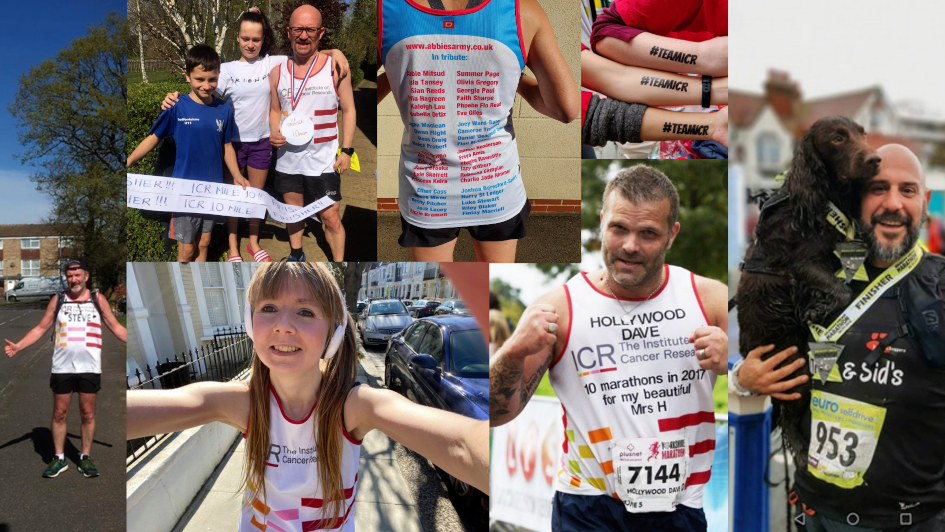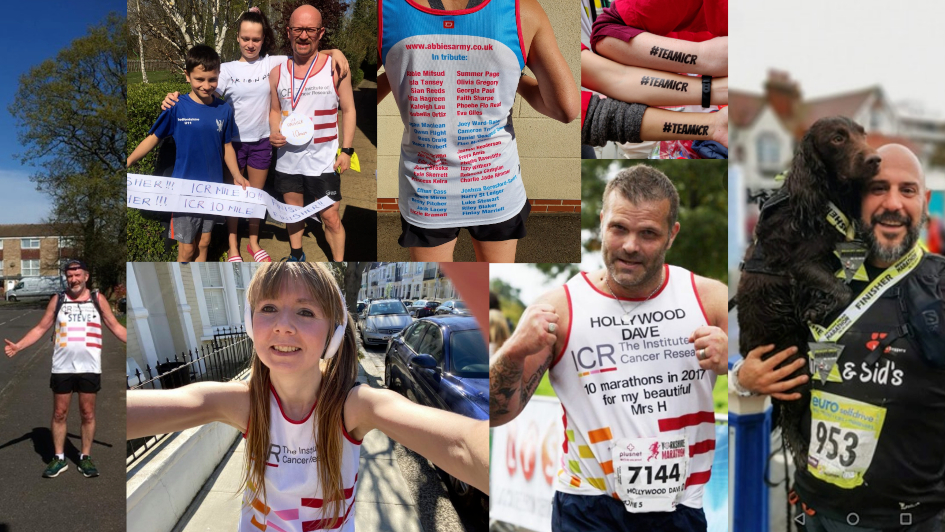Training for a marathon in a pandemic: the fundraisers helping us finish cancer

As sports events around the world are put on hold in the midst of the coronavirus crisis, Joanne Duffy finds out how #teamICR have come together to support each other, adapt their training and focus on what really matters to them.

Image: #teamICR members
The global coronavirus outbreak has presented a huge challenge, affecting the way many of us work, socialise and exercise.
With many of the year’s key sporting events postponed, including the London Marathon, those who were due to take part in fundraising sports and challenge events must now adjust their training to adhere to government guidelines, while still keeping up their preparations.
#teamICR fundraisers play a vital role in raising money to support our work – including the world’s first anti-evolution drug discovery programme, the research that will take place in our new Centre for Cancer Drug Discovery. Fortunately, they’re a determined and tenacious group.
They usually discuss training, co-ordinate runs and share ideas in a dedicated #teamICR Facebook group. For many of its participants, it’s also a support network – and in recent weeks, it’s become a valuable way to connect with fellow athletes facing the same challenges of training during the current crisis.
Group meet-ups have been off the table since social distancing guidance was introduced. But that hasn’t stopped the group from encouraging each other. They’ve even gone for a run together - virtually. Sticking to their own locales, many of them went out pounding the pavement solo in their ICR vests, sharing updates and encouraging each other online afterwards with pictures from their run.
As they adapt to this unprecedented situation, we asked some of the members of #teamICR what inspires them to keep going:
Remember why you started
Susan Farrow has been training to run two half marathons and the London Marathon this year and despite the postponements, she is as committed to her running as ever:
“Later this year, I’ll be running my 3rd Great North Run for the ICR. It’s a special run for me, as I watched it with my Mum in 2017 when she was very poorly with cancer and nearing the end of her life. I said then that I would do it, and I ran the race in September 2018. After losing my Nanny to cancer a few years previously too, the amazing work of ICR was something I really wanted to support.
“My Dad died unexpectedly on World Cancer Day in February. A couple of lovely members from the #teamICR group messaged me to see if I was okay after noticing my lack of posts. They sent lovely messages of support and we’ve stayed in contact. I’m really grateful for them.
“There is a sign in my gym that says, ‘remember why you started’, so every time I did a training run in my ICR top I took my photo there to remind myself why I was running.”
Join the #teamICR Facebook group now, to raise vital funds to help us continue making the discoveries that defeat cancer.
Sticking to a structure
James Fuller was due to participate in a whole host of fundraising events for the ICR that have now been postponed or cancelled. But he’s staying positive and keeping up his training – with the help of his dog Sidney:
“I think it's more important now than ever that we have a structure to stick to. I love bringing my dog out on runs, but as the temperature rises, he will be staying at home. I’m finding myself far less active than normal working from home, so for my own physical and mental health I have to keep running.
“I have, however, been struggling with an Achilles injury that I've ignored since last September. I’m using this time for rehab so I'll be able to come back fitter and stronger for my next race... whenever that may be!”
Focussing on the finish line
Patricia Holland is fundraising for Abbie’s Army. The charity supports childhood brain tumour research at the ICR and Patricia is one of three runners who have joined #teamICR on their behalf. She’d entered seven events leading up to the marathon, to help keep her training on track:
“I cut right back on my training for a couple of weeks after I heard the races were called off - I completely lost my mojo. It was my brother and friends in my local running club who picked me and reminded me that the training I had put in wouldn't be wasted and that now more than ever, Abbie's Army would need me to cross the finish line and raise much-needed money.
“For each race that’s been postponed or cancelled, I've instead run them solo as a virtual race. It helps keep me positive and with 6 months to go until the rescheduled marathon, this gives me something closer to aim for.
“I'm stronger than ever at the moment - I keep thinking of the 42 names on my running vest, and that gives me the encouragement I need.”
The dedication of family charity partners like Abbie’s Army drives forward our research immeasurably.
Leading from the front
David Griffiths is the ICR head coach. He supports the ICR runners every step of the way, and motivates the team to stay positive and dedicated, no matter what their ability.
“I ran 10 marathons and a 72-mile ultra-marathon across the country in 2017 for the ICR, as my wife was fighting cancer. I wanted to raise as much money as possible and doing something that extreme brought in around £9000 for the charity.
“The ICR backed me all the way and I promised them I would run a 100-mile race in their honour, so my next challenge will be to keep a promise made to the greatest charity in the world. And it will be done - I’ve never failed anything once I’ve made a promise in my life.
“I’ve loved being head coach for the last 3 years and, if truth be told, the legends in #teamICR motivate me to keep pushing on. You can’t be a head coach if you don’t lead from the front!”
Help us finish cancer
Thanks to our fundraisers and donors, the ICR’s researchers are poised to tackle cancer’s ability to become resistant to drugs, with the world’s first anti-evolution drug discovery programme in our new Centre for Cancer Drug Discovery.
The Centre will bring together drug discovery and evolutionary scientists to create a new generation of treatments that can stop it developing resistance to drugs and turn it into a manageable or curable disease.
But we still need help to finish and equip the new building. Funds raised by our amazing #teamICR will support our work, including the completion of the centre and help us to create a new generation of treatments that will make a difference to millions of people with cancer.
Find out more about the challenge of cancer drug resistance and help fund research to finish cancer.
 Pathways Drug Rehabilitation Luxury Addiction Treatment & Detox Center
Pathways Drug Rehabilitation Luxury Addiction Treatment & Detox Center


